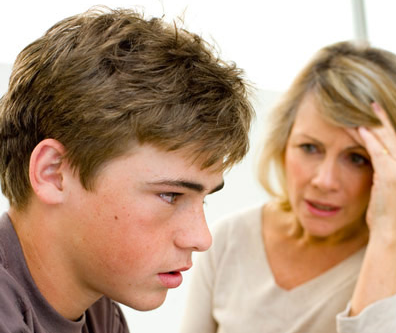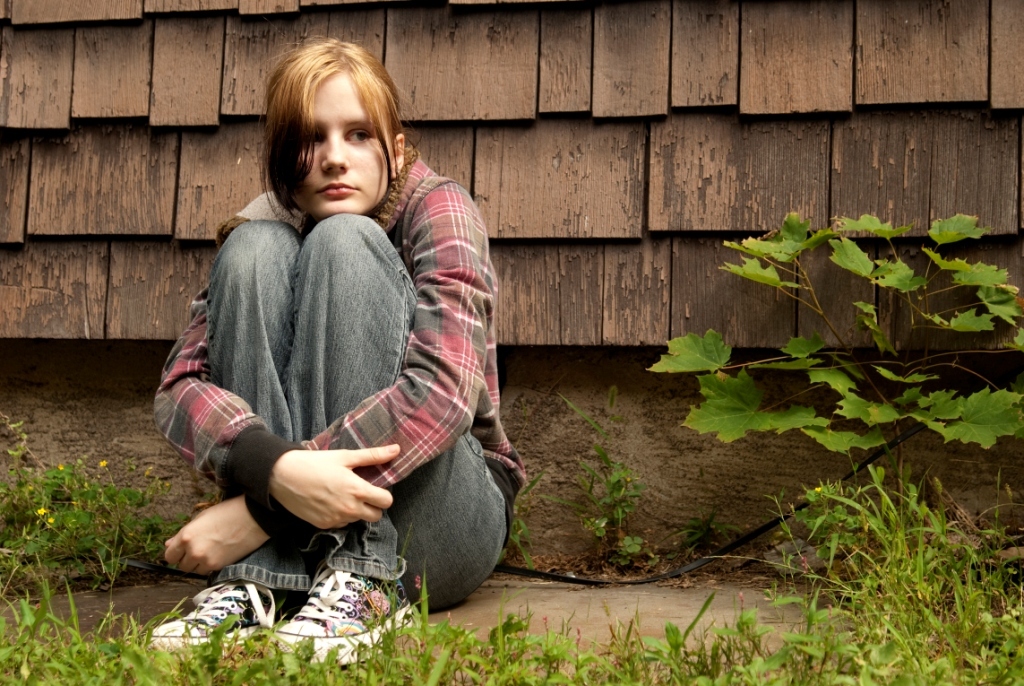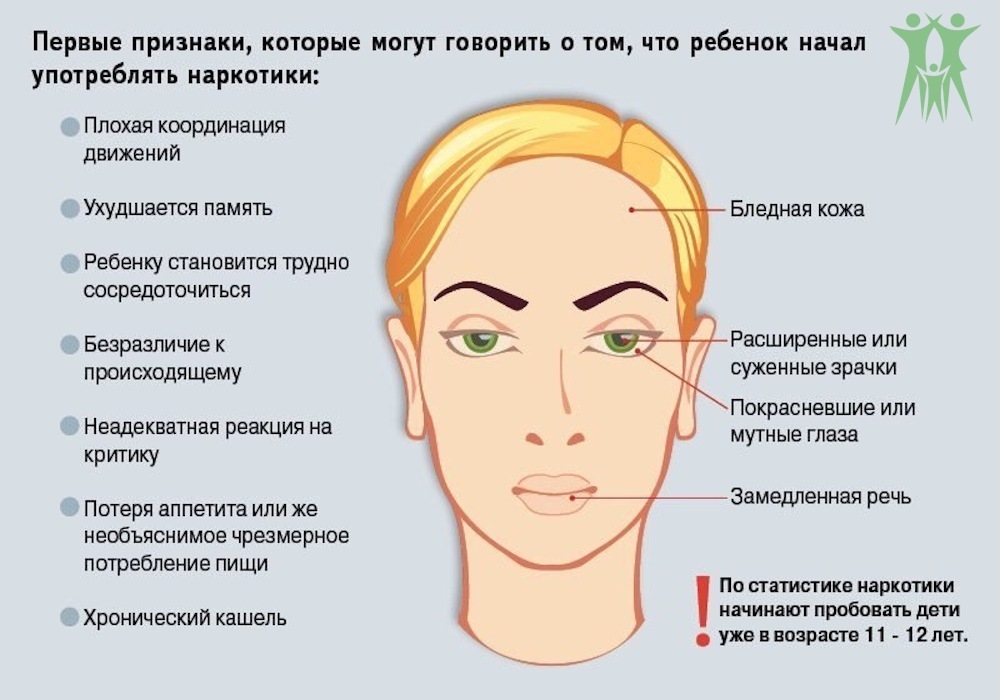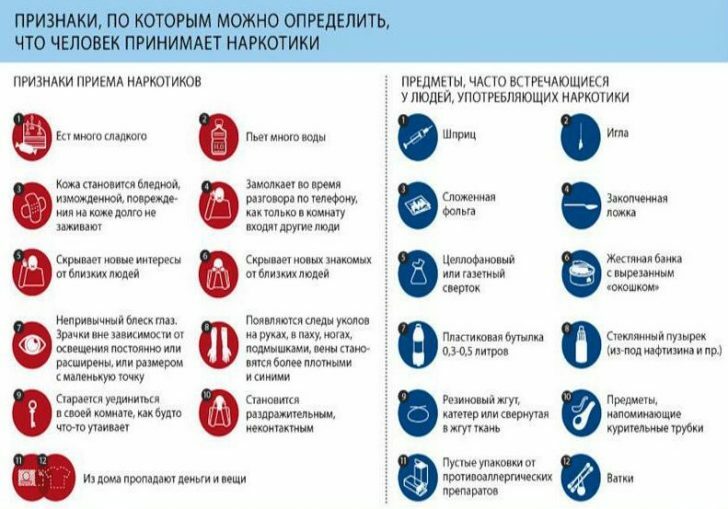How to recognize a drug addict's child: signs of drug use

Relatively recently all schools started testing students for drug use.And this "event" became a real stress, and, absolutely for everyone.Students resist such control;Teachers are nervous because of riots and constant discussions of tests in the classroom;Parents are awed by the results with horror.Meanwhile, there are ways to recognize a child who uses drugs, without such extreme activities - you just need to read the recommendations of specialists.
Contents: Why do children become addicts Signs of narcotic intoxication in adolescents What should parents do?Why children become addicts

Inna Khamitova( family counselor, clinical psychologist) assures that children do not become addicts "just like that", there is always some reason for this. It also identifies certain groups of risk:
- Poor home furnishings.Lack of finance, the eternal problems associated with survival against a background of low wages, quarrels between parents - all this can push the child to addiction.It is important that even with all the troubles and problems in the family there should be a calm and benevolent atmosphere, the child should feel and know that his homes are waiting and loved.Otherwise, the child may need a different reality - this is a direct way to addiction.
- Constant monitoring by parents.What I ate, how I read, where I left, when I come, how many lessons, who are friends - such constant control does not give the child a feeling of love, he understands that parents simply fulfill their duties.The child, after all, will want to escape from such total control, however, he can not do this - "obedient", controlled.And just in this case the child begins to riot "quietly", behind the back of parents - drug addiction is an excellent occasion to demonstrate their independence in this case.
- The dictatorial regime.Mom and Dad used to command the child, they demand from him complete submission - "not a step to the side."Such a child does not have his own opinion, only Mom and Dad can decide what to do, with whom to make friends, what films to watch and what to do outside of school.In this case, if someone authoritative in his eyes says that to try drugs - this is right and "cool", he blindly obeys the call.
"It is very important not to crush your child with authority, - says school psychologist Olga NOVIKOVA , - do not say" listen to me ", but ask" what do you think? "It's asking, offering to decide,Situation, person.If the child talks about some "cool" classmate, ask, but what is really cool about this person?Ask how it should be done in this or that situation.Let the child learn to think with his head, then at the right time, he will make a decision and weigh what is good, what is bad "
- Satiety.The child is not denied anything - he gets everything he wants, often parents foresee his desires.The child does not have enough communication and attention, because the parents try to compensate for their absence in the life of the child with their gifts.As a result, he wants something new, unexplored and even forbidden - another reality simply becomes a dream.And it comes true. ..
- Insecurity.Children feel like strangers in the classroom, in the company, they doubt their own attractiveness and "coolness".But the use of drugs gives them the feeling that he is "like everything and even steeper".
Signs of narcotic intoxication in adolescents
 To understand that a child has started using narcotic substances, you need to know the first signs of drug intoxication. What parents need to remember:
To understand that a child has started using narcotic substances, you need to know the first signs of drug intoxication. What parents need to remember:
- When using opiates, the child will have narrowed pupils, small amounts of food eaten, cold hands and heart palpitations.The child will sleep a lot, become stiff, the skin becomes pale and dry.
- If "stimulants" are used, the physical changes will be as follows: high blood pressure, rapid heartbeat, increased excitability, the child begins to "jerk" about and without.The condition can change very quickly - from the aggression to the depression there are literally hours, often the child is haunted by paranoid thoughts( followed, allegedly, watched, chased).
- When using marijuana or hashish - the appetite is sharply increased, the child laughs a lot and without reason, the pupils do not react to light, the condition is replaced by depression.
- In the things of the child you can find objects that have not previously seen - tubes or hookahs, foil, PET bottles with a perforated lid.
- The child started smoking and does not hide.The fact is that tobacco smoking itself is not a drug addiction, but cigarette smoke / odor perfectly masks the characteristic sweet aroma of drugs.
- The child constantly aspires to leave the house - independently it is caused to descend in shop, to take out a bucket with garbage though earlier such zeal it was not appreciable.
- There are new friends in the environment of the child - you know about it, but the child categorically refuses to acquaint you with them, and the stories about them are too meager.
- The phone, the tablet, the computer are password-protected, it makes sure that none of the relatives gets into his pages on social networks, always reacts sharply to phone calls, and goes to another room or from the apartment / house to talk on the phone.
- A child is constantly in need of money - he asks them from his parents, devises non-existent reasons( for example, to pass to school for repairs or some kind of exercise).If money and things began to disappear from the house, it would mean that the child was specifically hooked on drugs.
- The dream of the child changes - he either suffers from insomnia, or vice versa, he constantly tends to sleep.Simultaneously with these changes, parents note either loss of appetite, or bouts of sudden gluttony.
- Previously sociable, the child suddenly began to ignore and even be afraid of communication with parents, even the sight hides.
- Constant apathy - the child never wants anything, he is not interested in going to the store, cinema novelties, buying furniture and cars.

For more information on the signs of drug intoxication, including when you use synthetic drugs with a teenager, you will get a look at this video review:
What should parents do?
If there are signs of drug use, then parents should take urgent measures - it is only at the very beginning that you can save the child from imminent death. Inna Khamitova recommends proceeding as follows:
-
 Directly ask if the child used something forbidden.Usually children either answer in the affirmative, or they begin to hide their eyes or, conversely, openly and loudly shout, "how could such a thought".If the affirmative answer is not immediately received, then you need to "include" the dictator and intimidate him with a trip to the narcologist.
Directly ask if the child used something forbidden.Usually children either answer in the affirmative, or they begin to hide their eyes or, conversely, openly and loudly shout, "how could such a thought".If the affirmative answer is not immediately received, then you need to "include" the dictator and intimidate him with a trip to the narcologist. - If an affirmative answer is received, then it is necessary to act urgently, immediately - a gentle and kind parent should cease to be.Drug use is not a joke, for the benefit of the child you need to become rigid, principled.The first thing you need is to visit a children's narcologist.
- It is necessary to change the environment of the child, up to changing schools, moving to another district of the city or in general to another region.
- It is necessary to constantly accompany the child, literally to impose the company - let it be against, let shouts and cries.You need to be adamant in your decision and not succumb to the persuasions and assurances of the child.
- Pay attention to your own family - organize family dinners, going to the movies, picnics, games and so on.At first the child, naturally, will actively resist and demonstrate his protest in every possible way.Do not react to such rebelliousness - believe me, he needs a sense of family and love.
Yes, it is very difficult to combat children's drug addiction, but only decisive actions of parents and the help of specialists will be able to return the child to a normal, healthy and fulfilling life.
Tsygankova Yana Aleksandrovna, medical reviewer, therapist of the highest qualification category



